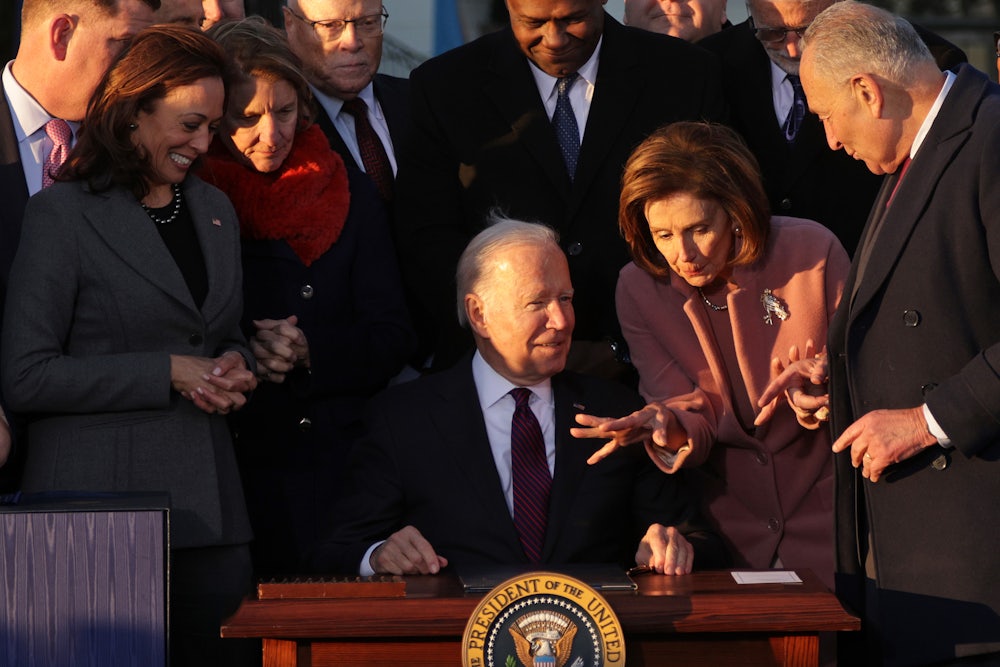President Joe Biden has notched two legislative victories in November, with the House last week passing the Build Back Better Act, his massive social spending, tax and climate bill, and approving a bipartisan bill aimed at revamping the nation’s crumbling infrastructure earlier this month. Biden signed the Infrastructure Investment and Jobs Act, or IIJA, in a triumphant ceremony last week, heralding a bipartisan victory that will infuse $550 billion over a decade in new spending for the nation’s roads, bridges, ports and transportation.
The bipartisan infrastructure bill was the culmination of months of negotiations, and relies on some controversial revenue raisers. Tucked away in the law is a retroactive repeal of a tax credit that was established to help businesses and nonprofit organizations who found themselves struggling economically due to the coronavirus pandemic. First established by the CARES Act last year, the Employee Retention Credit is a refundable tax credit for employers whose operations were fully or partially suspended or who saw a significant decline in “gross receipts” due to the pandemic, aimed at helping these organizations keep their employees on the payroll. The credit, which was extended by the American Rescue Plan in March to cover the third and fourth quarter of 2021, has been helpful in particular to nonprofit organizations that have seen a significant decline in funding and have been affected by a nationwide labor shortage.
But the IIJA retroactively eliminated the credit for the fourth quarter, ending it as of September 30, with the repeal expected to raise around $8 billion. This creates a dilemma for employers that had planned on claiming the credit in the fourth quarter, as well as some organizations that now may have to pay back any credit advances already taken.
Several organizations in the National Council of Nonprofits, including the YMCA of the USA, Boys & Girls Clubs of America, and Girl Scouts of the USA, said in a statement last week that they were “disappointed” the IIJA had eliminated the credit for the fourth quarter, calling it a “lifeline for many nonprofits.” (Larger charities could not take part in the Paycheck Protection Program, a pandemic relief measure intended to aid small businesses.)
“It has allowed them to retain critical employees in the face of the economic challenges caused by the pandemic. Tens of thousands of organizations are now counting on fourth quarter 2021 access to [the credit] to support the financial decisions they made to bring employees back on the payroll and increase operating capacity to serve their communities,” the statement said. The organizations urged Congress to allow charitable nonprofits access to the credit for the fourth quarter of 2021 and extend it through 2022, as well as amend the definition of “gross receipts” for the program to “better reflect revenue available to support nonprofits amid the pandemic.”
A recent survey from the National Council on Nonprofits found that nonprofit organizations were struggling to fill job vacancies, with 80 percent of respondents listing salary competition as a factor preventing them from filling openings. This has real-world consequences for nonprofits and the communities they serve, the survey found, resulting in longer waiting times for services, and greater burnout among employees working for organizations that are short-staffed. It also found that while 15 percent of respondents reported claiming the Employee Retention Credit across the board nationally, that percentage was higher in some states.
Some groups have already raised concerns about potential penalties organizations may now face; in late October, the American Institute of CPAs asked the chairs and ranking members of the Senate Finance Committee and House Ways and Means Committee to direct the IRS and Treasury Department to “waive any penalties and provide a reasonable, practical method for payment of unpaid employment taxes.”
Dozens of Oregon and national nonprofits also sent a letter in September to Senate Finance Committee Chair Ron Wyden, who represents Oregon, asking the committee to consider extending the credit in its portion of the Build Back Better Act. The letter noted that 600,000 nonprofit jobs had been lost due to the pandemic, and had not returned as of July.
“Nonprofits are doing everything we can to serve communities across America during the pandemic. As the nation recovers, our sector will play a critical role in rebuilding the economy, restoring livelihoods, and strengthening communities,” the letter said.
However, it’s unlikely that a restoration of the credit ends up in the final version of the Build Back Better Act, given the competing priorities and the cost.
The Internal Revenue Service has not yet provided guidance for employers that have claimed the credit or planned on doing so, although IRS associate chief counsel Rachel Leiser Levy said last week that the agency would soon address the issue.
“Rest assured, we are aware of this problem,” Leiser Levy said during a program hosted by TEGE Exempt Organizations Council. “We were aware of the problem when we saw the legislative language. We are more aware of the problem now, as many, many people have reached out to us to share their consternation. We understand it.”










